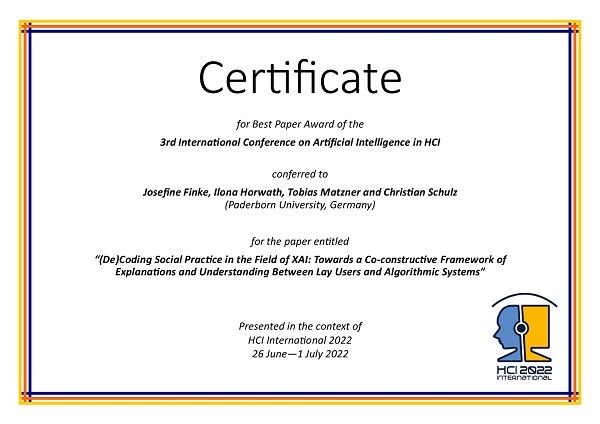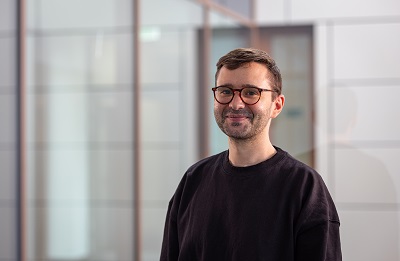
Certificate for Best Paper Award of the 3rd International Conference on Artificial Intelligence in HCI
The award has been conferred to
Josefine Finke, Ilona Horwath, Tobias Matzner and Christian Schulz
(Paderborn University, Germany)

Christian Schulz
(presenter)
for the paper entitled
"(De)Coding Social Practice in the Field of XAI: Towards a Co-constructive Framework of Explanations and Understanding Between Lay Users and Algorithmic Systems"
Presented in the context of
HCI International 2022
26 June—1 July 2022
Paper Abstract
"Advances in the development of AI and its application in many areas of society have given rise to an ever-increasing need for society’s members to understand at least to a certain degree how these technologies work. Where users are concerned, most approaches in Explainable Artificial Intelligence (XAI) assume a rather narrow view on the social process of explaining and show an undifferentiated assessment of explainees’ understanding, which mostly are considered passive recipients of information. The actual knowledge, motives, needs and challenges of (lay)users in algorithmic environments remain mostly missing. We argue for the consideration of explanation as a social practice in which explainer and explainee co-construct understanding jointly. Therefore, we seek to enable lay users to document, evaluate, and reflect on distinct AI interactions and correspondingly on how explainable AI actually is in their daily lives. With this contribution we want to discuss our methodological approach that enhances the documentary method by the implementation of ‘digital diaries’ via the mobile instant messaging app WhatsApp – the most used instant messaging service worldwide. Furthermore, from a theoretical stance, we examine the socio-cultural patterns of orientation that guide users’ interactions with AI and their imaginaries of the technologies – a sphere that is mostly obscured and hard to access for researchers. Finally, we complete our paper with empirical insights by referring to previous studies that point out the relevance of perspectives on explaining and understanding as a co-constructive social practice."
The full paper is available through SpringerLink, provided that you have proper access rights.